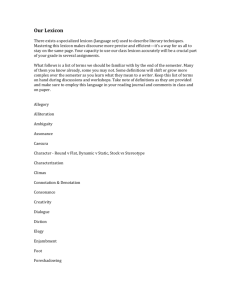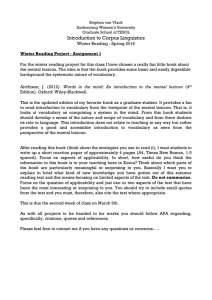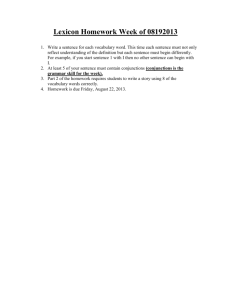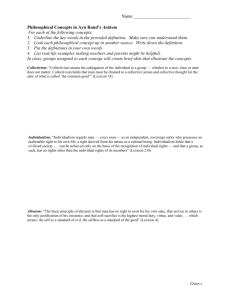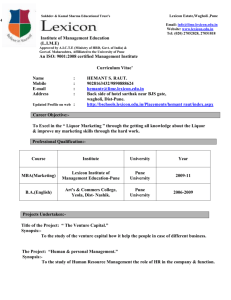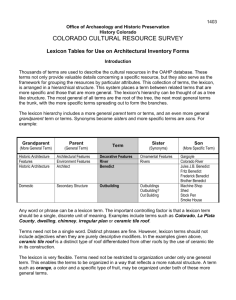English 475/(HEL) History of the English Language
advertisement
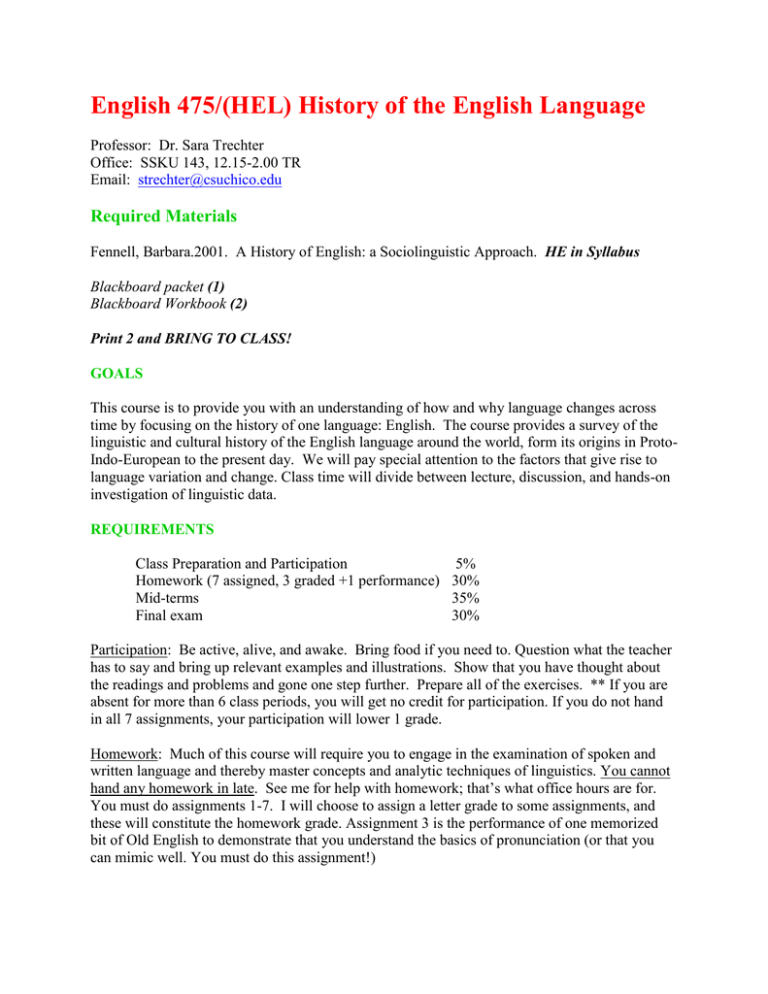
English 475/(HEL) History of the English Language Professor: Dr. Sara Trechter Office: SSKU 143, 12.15-2.00 TR Email: strechter@csuchico.edu Required Materials Fennell, Barbara.2001. A History of English: a Sociolinguistic Approach. HE in Syllabus Blackboard packet (1) Blackboard Workbook (2) Print 2 and BRING TO CLASS! GOALS This course is to provide you with an understanding of how and why language changes across time by focusing on the history of one language: English. The course provides a survey of the linguistic and cultural history of the English language around the world, form its origins in ProtoIndo-European to the present day. We will pay special attention to the factors that give rise to language variation and change. Class time will divide between lecture, discussion, and hands-on investigation of linguistic data. REQUIREMENTS Class Preparation and Participation 5% Homework (7 assigned, 3 graded +1 performance) 30% Mid-terms 35% Final exam 30% Participation: Be active, alive, and awake. Bring food if you need to. Question what the teacher has to say and bring up relevant examples and illustrations. Show that you have thought about the readings and problems and gone one step further. Prepare all of the exercises. ** If you are absent for more than 6 class periods, you will get no credit for participation. If you do not hand in all 7 assignments, your participation will lower 1 grade. Homework: Much of this course will require you to engage in the examination of spoken and written language and thereby master concepts and analytic techniques of linguistics. You cannot hand any homework in late. See me for help with homework; that’s what office hours are for. You must do assignments 1-7. I will choose to assign a letter grade to some assignments, and these will constitute the homework grade. Assignment 3 is the performance of one memorized bit of Old English to demonstrate that you understand the basics of pronunciation (or that you can mimic well. You must do this assignment!) Midterms: See the schedule. Each exam will involve a combination of linguistic problem solving, identifications, short-answer questions and mini essays. Review sheets will be provided for the exams. Final: Cumulative. UNIVERSITY ACADEMIC INTEGRITY POLICY The students, faculty, administrators, and staff of CSU, Chico are committed to a culture of honesty in which members of the community accept responsibility to uphold academic integrity in all they say, write, and create. A student caught cheating or plagiarizing will receive an F on his or her work. Further disciplinary procedures will apply as specified by university policy. “Plagiarism occurs when a [student] deliberately uses someone else’s language, ideas, or other original (not common-knowledge) material without acknowledging its source. Cheating is intentional fraud or deception for the purpose of improving a grade or obtaining course credit and includes all behavior intended to gain unearned academic advantage. Cheating includes either helping or attempting to help another person cheat.” HOW TO GO THROUGH HEL AND LIKE IT Come to class early and often. A single class can never be made up. Be prepared. Do the readings in advance. Keep up with the homework: do each chapter’s assignment while it is being discussed in class rather than waiting until the last minute to complete the entire assignment. Be an active learner. Linguistics is like math; it requires you to understand and carry out procedures rather than to memorize answers only. Don’t just let the details wash over you; master them so that you can apply them yourself. Ask Questions. You should also come to office hours regularly and/or contact me by e-mail or phone if you encounter any problems in the class. Talk to classmates. You are strongly encouraged to study in pairs or groups. Stick around. This course is a survey of many different facets of the English language. You may not like or understand all the issues we explore, but you’ll probably enjoy and excel at some of them, so be patient. Schedule: English 475 (tentative: subject to change) The schedule is by week! Do the reading assignments as soon as they appear on the schedule. *If you cannot take the exams or final on the scheduled dates, you should not take this course. DATE TOPIC COURSE TASKS Week 1 Jan 20 Introduction to the Course -Linguistics overview per HEL -Review of English phonology Read HE: p. 11-12 & Chapter 1 Week 2 Jan 27 Prehistory of English 4000 BCE- 450 CE OE (450-1150) -finish phonology -proto IE homeland -overview: cultural “occupations” OE phonology -runes, writing -introduction to poetry -pronunciation of sounds Read HE Chapter 2 HW 1 due: Blackboard Workbook p. 31, exercises 19-21 OE Syntax -OE word order, case -OE verbal morphology Read/Listen Week 3 Feb 3 Week 4 Feb 10 Read HE Chapter 3 & http://www.dreamofrood.co.uk/ http://www.wwnorton.com/college/en glish/nael/noa/audio.htm http://www.heorot.dk/deor.html http://loki.stockton.edu/~kinsellt/litre sources/brun/brun2.html HW 2 due: Assignment 2 Week 5 Feb 17 Week 6 Feb 24 Week 7 March 3 OE Nominal Syntax and Poetry Performances -OE cases, number, & gender -demonstratives -pronouns Performance & Review Middle English (1150-1450) Phonological changes -cultural overview -English as a creole? http://faculty.virginia.edu/OldEnglish/c ourses/handouts/magic.pdf HW 3 & 4 due: see assignments. Exam 1 (see BB for review) Read HE Chapter 4 Week 8 March 10 -sound changes, why ME Syntax and Morphology -changing percentages -morphological losses and analogy -awareness of language change HW 5 due-BB Workbook p 126-27 exercise 6.4 Listen to Lexicon Valley, Number Theory http://www.slate.com/articles/podcast s/lexicon_valley/2014/11/lexicon_valle y_the_history_and_evolution_of_writin g_out_numbers_in_the_english.html Spring Break Whew! Week 9 March 24 Week 10 March 28 Week 11 April 7 Week 12 April 14 Week 13 April 21 Week 14 April 28 Early Modern English (1450-1750) -cultural overview -standardization & the rise of grammars and dictionaries EME Phonology and Syntax -new phonemes -the Great Vowel Shift EME cultural/social summary -salons and scientists -vocabulary expansion -Dr. Johnson & Thrale Piozzi -Review English and Colonialism -Creoles -dialects and phonology -vowel shifts -British/American English -dialects & grammar Read HE Chapter 5 BB reading 1 (Bodine) HW 6 due-bb Workbook p. 151 Ex 7.3 BB reading 2 (McElhinny) Listen to Lexicon Valley, dude! http://www.slate.com/articles/podcast s/lexicon_valley/2014/01/lexicon_valle y_the_etymology_and_early_history_o f_the_word_dude.html Exam 2 Read HE Chapter 7 Listen to Lexicon Valley, lagniappe http://www.slate.com/articles/podcast s/lexicon_valley/2014/08/lexicon_valle y_the_etymology_and_history_of_a_m ystery_word_with_lexicographer.html HW 7 due Listen to Lexicon Valley for some snark http://www.slate.com/articles/podcasts /lexicon_valley/2014/10/lexicon_valley_ the_etymology_and_history_of_the_wo rd_snark_with_lexicographer.html Week 15 May 5 -dialects & vocabulary Global English/Language Death -Review for final BB reading 3 (Azrui)
